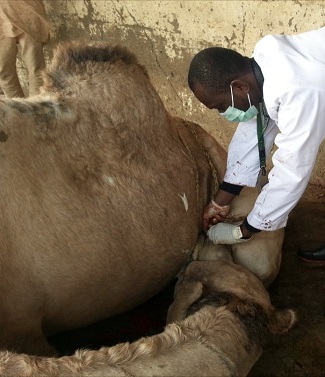06 March 2018
An international research team, led by virologists at the School of Public Health, Li Ka Shing Faculty of Medicine at The University of Hong Kong (HKU), provides the first comprehensive study of MERS (Middle East Respiratory Syndrome) coronaviruses in Africa. The findings are now published in the latest issue of Proceedings of the National Academy of Sciences, one of the world's most-cited and comprehensive multidisciplinary scientific journals. (link to the publication).
Background
MERS coronavirus, a virus related to but not identical to SARS coronavirus, causes severe pneumonia with high fatality and is a cause of global public health concern. Since its discovery in 2012, over 2,100 laboratory confirmed cases have been reported, over 700 of these being fatal. It has repeatedly caused large outbreaks within hospitals in the Arabian Peninsula. One returning caused an outbreak in South Korea in 2015 leading to 186 cases and having a huge impact on the South Korean economy. The animal source of human infection is dromedary (single-humped) camels in the Arabian Peninsula. The virus is also found in camels across East, North and West Africa but humans have not known to acquire MERS from camels in Africa. The reason for this has remained unclear. This study aims to address this question.
Research method and findings
The team at the School of Public Health at HKU coordinated and led a multi-national research consortium of scientists from multiple countries in Africa, Saudi Arabia, China, Europe and the USA to study MERS-coronaviruses in camels in West (Nigeria, Burkina Faso), North (Morocco) and East (Ethiopia) Africa. They coordinated the collection and analysis of 2,609 samples from camels in multiple African countries. They confirmed that MERS coronavirus infection was as common in camels in Africa as it was in Saudi Arabia. They found that the MERS coronaviruses from Africa were genetically very similar to, but distinct from, those in the Arabian Peninsula. Detailed investigation of viruses from West Africa showed that they had reduced ability to infect the human respiratory tract and to replicate in the lungs of mice made susceptible to MERS coronavirus infection. The researchers conclude that the MERS-coronaviruses from West Africa may pose a lower risk to humans.
Significance of the study
It is important to understand whether MERS coronaviruses in Africa pose a significant threat to human health. Over 70% of the global dromedary camel population is found in Africa. Our study has shown that these camels are as commonly infected by MERS-coronavirus as are camels in the Arabian Peninsula. If MERS coronaviruses from Africa are similar to those in the Arabian Peninsula in their risk to humans, current public health measures would have to be reassessed; advice to travellers to multiple African countries would need to be modified and doctors would need to be warned to be alert for MERS in travellers returning from Africa, as well as the Arabian Peninsula. Professor Peiris who led the study says, “Although we found that MERS coronaviruses are as common in camels in Africa as in those in the Arabian Peninsula, the African viruses are genetically different; and in particular, the viruses from West Africa which we have studied in detail appear to be less able to infect the human respiratory tract.” Professor Leo Poon says, “Our research suggests that West African MERS coronaviruses may pose lower threat to humans but more research is urgently needed on MERS coronaviruses in Africa, especially those from East Africa”.
The work was supported by the Contract HHSN272201400006C from the CEIRS network of NIAID, National Institutes of Health, USA and a Commissioned Grant from the Health and Medical Research Fund of the Government of Hong Kong.
About the research team
This international collaborative study was led by Professor Malik Peiris, Tam Wah-Ching Professor in Medical Science and Chair Professor of Virology, School of Public Health, HKU and Professor Leo Lit Man Poon, Division Head of Public Health Laboratory Sciences at the School of Public Health. Other HKU scientists contributing to the research included Drs Daniel KW Chu, Kenrie PY Hui, Ranawaka APM Perera, Michael CW Chan, Ray TY So, Ziqi Zhou at the School of Public Health, HKU and Professor John M Nicholls at Department of Pathology, HKU. International collaborators included Dr Eve Miguel, CIRAD, University of Montpellier, France; Professor Stanley Perlman, University of Iowa, USA; Professor Christian Drosten, Charite-Universitatsmedizin Berlin; Professor S Kuranga, University of Ilorin, Nigeria; Professor G Mamo, Addis Ababa University; Dr A Traore, CNRS, Burkina Faso; Dr O Fassi-Fihri, Hassan II University, Morocco and Professor Andrew Rambaut, University of Edinburgh.
Professor Malik Peiris
A sampling event conducted by this research team in West Africa.
Media enquiries
Please contact LKS Faculty of Medicine of The University of Hong Kong by email (medmedia@hku.hk).



Follow HKUMed